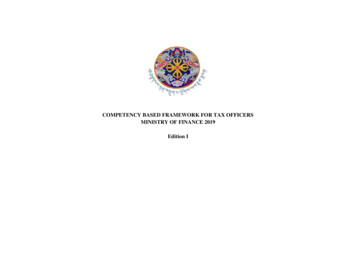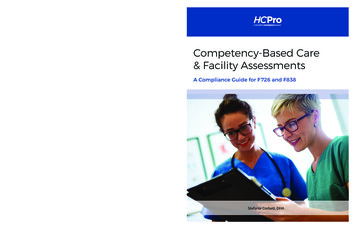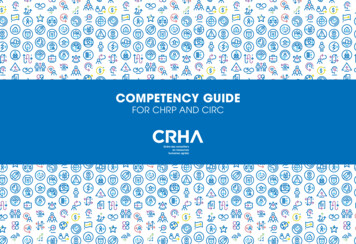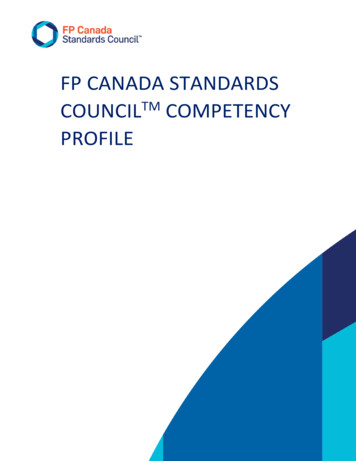
Transcription
COMPETENCY BASED FRAMEWORK FOR TAX OFFICERSMINISTRY OF FINANCE 2019Edition I
Aim:The concept paper aims at seeking approval of the Royal Civil Service Commission and management to:1.Implement the competency based framework for tax officers,2.Prioritize training for capacity building based on gaps identified.Background & RationaleThe Royal Civil Service Commission launched a competency based framework (CBF) in August 2018 for civil service incollaboration with Singapore Polytechnic with funding support from Temasek Foundation International, Singapore and the RoyalGovernment of Bhutan. The programme is aimed at strengthening the capacity and capabilities of the civil servants based on their rolespecific competency, to enhance professionalism, growth and development to contribute optimally to nation building.The CBF of the Tax Officers has been developed to further enhance the capacity and capabilities of the tax officers in line withVision, Mission and Objectives of the Department of Revenue & Customs and the Ministry of Finance. The CBF of the Tax Officersincludes 3 Role Profiles, 9 Competency Areas and 23 Competencies. The overview of the framework is attached as figure I. Thus,this document shall: Provide a structured approach/Road-map to build competencies required for the Tax Officers at different Position Levels, Enhance the technical capacity of the tax officers to maximize the organizational performance. Provide greater role clarity and allow Tax Officers to take ownership for continuous professional Development. Guide and ensure optimum utilization of limited resources allocated for Professional Development of Tax Officers,
Output and Process UndertakenThrough a rigorous consultative and inclusive process, the role profiles, competency areas, competencies, behavioral indicators andproficiency levels were developed.Output I. 3 Role Profiles, 3 Competency areas, 23 Competencies and 47 Behaviour Indicators were developed across 4 proficiencylevels and validated from 29th October to 15th November 2019. This was arrived through;1.Literature Reviews2.Identifying key competencies and developing Behavioural Indicators (BIs)3.Presentation to Tax Officers during Tax Meet at RRCO, Bumthang.4.Sought online feedback from Tax Officers across the Regional offices as well as Head OfficeOutput II. A training needs analysis was carried out for the Tax Officers under the Department of Revenue and Customs throughquestionnaires for different proficiency level via online survey conducted from 12th November to 15th November. The findings wereused to;1.Identify the competency gap at different proficiency level.2.Identify the methods of intervention to address it.Accordingly the finding or second draft was presented to the Department at the Annual Revenue Conference held atGelephu for validation and endorsement.RRCO,
Output III.Based on the findings of the TNA, several training/workshops/seminars were identified out of which few wereprioritized for the financial year 2019-2020 as per the instruction of the RCSC. The trainings were prioritized based on:1.Mandatory competency skills.2.Relevant complementary assessment techniques.3.Availability of the training.Evaluation of Current SituationIt was noted that so far there were no specific role profiles developed for Tax officers and till date tax officers performed roles inreference to Generic Job description. The generic job description did not reflect a clear set of competencies and behavioral indicatorsTax Officers were expected to showcase. Further, the training availed by Tax Officers were not necessarily aligned with requiredCompetencies and position levels. Moreover, the roles of tax officers are very complex and require fulfilling the mandates of both aregulator and service provider. Thus, a tax official of the Department requires competencies in both the areas to effectively collectrevenue and deliver services to the public.Key RecommendationsThe following are the key recommendations based on the exercise carried out:1.Introduction of Introductory course on Income Tax Laws of Bhutan, relevant Accounting Standards and AuditingTechniques atfoundation level.2.Training to be focused on building competencies in financial statement analysis, assessment technique, and soft skills.
3.Department to give more focus on Digital transformation to be able to stay abreast of technology development and ITsolutions.ConclusionThis framework is designed to guide and assist Tax Officers to plan a career they aspire to. It is important for each individual to beaware of the observable Competencies expected of them and develop themselves through stages of expertise from foundation level toadvance level. It also inculcates integrity and responsibility as a civil servant, and builds a positive attitude in the discharge of service.This document will help the Department to prioritize and implement methods of interventions to address the competency gap withinthe 12th Five Year Plan. Appropriate training and workshops can be given seeking financial and human resources to implement theseinterventions. The Department may also pilot mentoring programs to enhance efficiency and effectiveness of assessing officials.Overview of the Department of Revenue & CustomsVision:Contribute to nation building through the development of an effective revenue system.Mission:To ensure that the Tax and Customs administration has the capacity to collect taxes efficiently and effectively at minimum costthrough impartial and consistent enforcement of regulations, and to provide a convenient and honest service to the taxpayersValues: Integrity Objectivity Transparency
Accountability ProfessionalismOverview of the Income Tax DivisionVision:To develop an effective tax system that will serve as a fiscal policy tool to regulate the economy; adapt to changes, and contribute tothe growth of the economy through the mobilization of national revenue.Mission:To raise national revenues for the government in a fair and equitable manner by encouraging voluntary compliance to the rules andproviding efficient taxpayer services.
Key MilestoneCirculation ofQuestionnairesFirst DraftingWorkshop on CBF forHR k plan submission tofocal commissionerFinal DraftingPresentation to DRCManagement during AGMNov2019Presentation toHRC, MoFJan2020Validation ofBIs & TNAPresentation to TaxOfficers during TaxFeb2020March2020Endorsement fromDG and Collector,ITDPresentation to FocalCommissioner (RCSC)Presentation toRCSC
COMPETENCY FRAMEWORK FOR TAX OFFICERS
Figure 1
Annexure IOverviewNumber of Key Roles Identified3Number of Competency area identified9Number of Competencies Identified23Behavioral Indicator47Proficiency level4Descriptions of key Roles1.Tax CollectorTo collect taxes effectively and efficiently at minimal cost on a timely basis by conducting desk and field based tax auditing andimprove voluntary compliance.2.RegulatorCarry out effective and appropriate enforcement actions through impartial and consistent services to the taxpayer and provideclarification of tax practices and tax laws.3.Service Provider:To build a socially responsible taxpaying community by providing quality tax services and foster a competitive tax environment forthe nation's social and economic development through leveraging digital capabilities.
Competency Based Framework of Income Tax Officers.Role 1: Tax CollectorSl./No.Competency AreaKey Competencies1Behaviour Indicators1. Understands and applies the provisions of Tax Laws and Regulationscorrectly.Tax Knowledge2. Understands and applies any other relevant domestic and internationallaws.Domain Expertise/Knowledge1. Understands and applies the technical aspects of accounting.Business and accountingknowledge.2. Demonstrates an understanding of Business knowledge.21. Identifies and collects required data from within the department aswell as external agencies.Data Collection and
analysis2. Independently carries out data sampling, analysis technique andapplication.Compliance and riskmanagement1. Identify riskTechnical skills2. Risk prioritization.3. Risk Treatment (Translate strategic directions/plans into action plans)1. Plans and strategize on tax assessment.Tax assessment skills.2. Conduct tax assessment efficiently and effectively at minimum cost.3Strategic Vision.TechnologyDevelopment and ITSolution1. Adopt and integrate advance tax technology to support organizationalobjectives.Innovations/Researchand Development1. Reviews and recommends all revenue related matters, tax policies andplanning based on research findings.
Autodidactism1. Critically and willingly seeks out knowledge to support organizationalobjectives.Role 2:Tax RegulatorSl. No.1Competency AreaKey CompetenciesEnforcement.MonitoringBehaviour Indicators1. Enforce the tax law, organizational policies and procedures withoutany fear and prejudice.2. Monitor the collection and deposit of Direct Tax3. Monitoring of Tax Administration SectionEmotional resilience2.1. Deal with stressful situations, while maintaining work performance.1. Demonstrates personal integrity and commitment to work.Accountability andTransparencyCredible TaxAdministration2. Takes responsibility for one’s actions and proactively works onimproving it.
1. Collect tax revenue in a manner which is fair, professional &respectful.Ethics2. Positive attitude.31. Demonstrates effective oral and written communication skills.Communication Skills2. Actively listens, provides constructive feedback and demonstratesrespect for differing views.Leadership andManagerial skills1. Effectively plans, set priorities and manage the performance of others.Managing Performance.2. Persuades, motivates and inspires others, developing a sense ofpurpose and unit.3. Creates and supports a climate in which people can do their best.Change Management1. Embrace change and innovation.
1. Anticipates possible problems and develops contingency plans inadvance by identifying what needs to be done and takes action beforebeing asked or before the situation requires it.Adaptability2. Anticipates the consequences of situations and plans accordingly.Anticipates how individuals and groups will react to situations and plansaccordingly.3. Develops solutions to new or highly complex problems that cannot besolved using existing methods or approaches and provides advice orsolutions in his/her technical area.1. Identifies main negotiating points of a given issue and engages ininteractive dialogue.Negotiation skills andConflict Resolution2. Displays the ability and the willingness to work towards a win-winoutcome by negotiating and resolving disagreement.3. Effectively manages conflict by negotiating conflict and dissolvingdisagreement.
1. Share knowledge and support peers, staff and others to increase skills,foster improvement and enhance outcomes.Team Work2. Ability to work effectively with diverse ethnicity, gender and class.3. Builds productive working relationships.Role 3: Service ProviderSl. No.Competency AreaKey CompetenciesTax Education1.Behaviour Indicators1. Proactively provides tax education and timely information throughvarious channels.Tax SocializationStakeholdercollaboration andpartnership1. Takes lead in communication and consultation, engaging with a widerange of stakeholders across divisions, departments and agencies.1. Make it easy for taxpayers to comply.Tax Simplification2Service Delivery andoperations2. Continuously review rules and procedures.
1. Skillfully serves diverse taxpayers.Taxpayer Assistance2. Provides information to taxpayers.1. Ensures the service area; facilities, equipment and materials used bythe officer are conducive to quality service delivery.3FacilitatorService QualityManagement2. Sets and complies with service standards and procedures to ensureconsistent quality service delivery.3. Portrays a professional image, through proper personal grooming,mannerisms and actions.4. Tracks, manages and improves performance standards for servicedelivery and manages referred cases for complaints and appeals.
1.Tax CollectorCompetency Area: Domain ExpertiseKey Competencies: Tax KnowledgeBI: 1. Understands and applies the provisions of Tax Laws and Regulations correctly.Foundation (P-5)Trained (P4-P3)Experienced (P 2)Advanced (P1)1. Able to demonstrate an 1. Able to interpret and apply 1. Analyse and explain the 1. Provide clear clarificationsunderstanding of the Tax Laws complextaxprovisions rationale behind the provisions and explanations on complexand Regulations.appropriately.of the Rules and Act.technical issues with regard toIncome Tax provisions.2. Able to apply provisions oftax laws correctly.2. Provide recommendations 2.Demonstratesexperton tax policy issues.understanding of tax laws andregulations.3. Identify and apply correct 3. Provide clear directives ortax laws and regulations and guidelines on application ofguide the staff to do the same. ambiguous provisions.BI: 2. Understands and apply any other relevant domestic and International Laws.
Foundation (P-5)Trained (P4-P3)1. Able to understand and apply 1.Able to understand otherrelevant domestic laws.relevant laws and relevantprovisions of international2. Basic understanding of taxation.relevant international laws.Experienced (P 2)Advanced (P1)1. Interpret and explain the 1. Provides clear directives andrationale on application of guidelinesoncomplexrelevant laws.application of laws.2. Identifies and applies correctdomestic and internationalprovisions and guide the staffto do the same.2.Has wide range of knowledgeof relevant laws andbestpractices in other countries andleads in review of prevailing taxpracticesExperienced (P 2)Advanced (P1)Key Competencies: Business and Accounting Knowledge.BI: Understands and apply the technical aspects of Accounting.Foundation (P-5)Trained (P4-P3)
1. Able to understand and read 1. Able to apply the relevant 1. Able to explain and guidethe basic financial statement of standardsofBhutanese subordinates in reading thebusiness operation.AccountingStandards financial statement.appropriately2.Understand the differentaccounting treatment betweentax accounting and financialaccounting (e.g. Depreciationmethods)2.Able to apply understandingof technical aspects of financeand accounting includingstatement of financial position,statement of comprehensiveincome, statement of cashflows, ratio analysis etc.1. Understands and providesclear clarification on domesticand international AccountingStandard.2. Able to understand and 2. Show advance level ofapply the domestic and accounting knowledge and itsinternationalaccounting corresponding impact on tax.standards.BI 2: Demonstrates an understanding of business knowledge.Foundation (P-5)Trained (P4-P3)1. Demonstrates awareness and 1. Understandknowledge of sector specific organizationbusiness operations.managesunderstandingsoftware andused.how businessoperates andincludingof accountingPOS systemCompetency Area: Technical SkillsKey Competencies: Data Collection and AnalysisExperienced (P 2)Advanced (P1)1. Understand how business 1. Provides advice and guide theorganization operates and subordinates in understandingmanagesincluding the business operation.understanding of accountingsoftware and POS system used.
BI: 1. Identifies and collects required data from within the department as well as from external agencies.Foundation (P-5)Trained(P4-P3)Experienced (P 2)Advanced (P1)1. Able to identify and collect 1. Able to compile, share and 1. Proactively gathers data 1. Guide subordinate in takingbasicdataneededfor explaindatainformation from within and external correct approach in identifyingassessment.needed for assessments.agencies, compile, explain and relevant information/data.share data information tosubordinates and supervisors.BI: 2 Independently carries out data sampling, analysis techniques and applications.Foundation (P-5)Trained (P4-P3)Experienced (P 2)Advanced (P1)1. Able to apply basic data 1.Able to gather, carry out 1.Demonstratesound 1. Ensures that subordinates aresamplingandanalysis data sampling and analyze knowledge of data processing using correct data and gets ittechniques for tax assessment.complexdatausing and analysisvalidated.appropriatemethodsandadvanced analytical tools.2. Able to explain the complexdata and simplify for taxofficials to use it.3.Be able to process, analysecomplex data and provide clearinterpretation of its outcome
Key Competencies : Compliance and Risk ManagementBI: 1. Identify RiskFoundation (P-5)Trained (P4-P3)1. Compile the list of noncompliancetaxpayers,segregate them under the fourpillars of non compliance andtake action accordingly.1. Can understand the causesof non compliant taxpayer’sbehaviors (is it because thetaxpayer is unaware, aware butignorant, intentional, complextax law and administration).1. Able to foresee future risk 1. Foresee future risk based onbased on the available the available information.information.Trained (P4-P3)Experienced (P 2)2. Demonstrates the basicknowledge to identify riskinvolved based on evidence.Experienced (P 2)Advanced (P1)2. Identify risk and adopt 2. Ensure that adequate andappropriatemeansof timely risk identification isdetection, investigation and conducted consistently.prevention.BI: 2.Risk prioritizationFoundation (P-5)Advanced (P1)1. Demonstrates examination 1. Able to priorities and assess 1. Prioritise risk depending on 1. Able to analyze the severityskills to prioritize risks the risk involved (Tax their level of intensity.of risk and the extent of itsidentified.registration, filing of taximpact on tax, and accordinglyreturns, declaring accurateprovide advice to subordinates
information and paying taxobligation on time).onriskprofilingprioritization.andBI: 3. Risk Treatment (Translate strategic directions/plans into action plans)Foundation (P-5)1. Able to follow a risk basedmethod of assessment coveringplanning, fieldwork, reportingand follow up.Trained (P4-P3)Experienced (P 2)1. Able to identify and apply 1. Adopt risk mitigationmethodstotreatrisk strategies.depending on the intensity ofthe risk.2. Recommend for waiverbased on its past complianceand records.Advanced (P1)1. Able to identify options forrisk treatment and develop anaction plan.2. Exercise different penaltyratesdependingonpastcompliance records.3. Carry out compliance plans.3. Regular review of complianceplans and progress.Experienced (P 2)Advanced (P1)Key Competencies : Tax Assessment SkillsBI: 1. Plans and strategize on tax assessment.Foundation (P-5)Trained (P4-P3)1. Demonstrates a capacity tolearn and apply new methodsandtechniquesfortaxassessment.1. Able to plan, set prioritiesand manage your own timeand ensure that actions andobjectives are fully achieved1. Plan, priorities and manage 1. Develop new strategies andtime to ensure that datelines, techniques for assessment.actions and objectives of thesection are fully achieved.2. Conduct periodic review of
by thedateline.teamwithintheassessmentplansand2. Conduct periodic review of programmesofTaxassessmentplansand Administration section/ RRCOs.2. Independently conduct tax programmesofTaxassessments in line with the administration section/RRCOs.Tax Act & Rules.3. Provide recommendation forany changes in assessmentplans and strategies.BI: 2. Conduct tax assessment efficiently and effectively at minimum cost.Foundation (P-5)Trained (P4-P3)1. Complete the allotted tax 1. Ensure best possibleassessments at minimum cost.outcomes with the limitedresources allocated for the taxassessments.Experienced (P 2)Advanced (P1)1. Able to provide guidance forconductingeffectiveandefficient assessment throughintellectual development of theassessing officials.1. Provide guidelines ssment through intellectualdevelopment of the assessingofficials.2. Monitoring and review ofassessment being conducted 2. Able to initiate comparativeand provide guidance in the studies on the work bearings 2.Proactivelyinitiatesarea where required.and use it for resource comparative studies on the workallocation.bearings and uses it for resourceallocation.3. Ensures judicious use ofpublic resources.3.Ensures judicious use ofpublic resources
Competency Area: Strategic VisionKey Competencies: Technology Development and IT Solution.BI: 1. Adopt and integrate advance tax technology to support organizational objectives.Foundation (P-5)Trained (P4-P3)Experienced (P 2)Advanced (P1)1. Able to use the current taxonline systems and other usefulIT products such as Microsoftoffice suite, mobile and webbasedapplications,socialnetworking apps, etc.1. Use and be able to assessthe need to enhance thecurrent tax technology cs tools etc. for taxassessments.1.Recognizedigitaltransformation and its effect toTax Administration, leveragingits opportunities and providingprotection from its potentialrisks.1.Recognizedigitaltransformation and its effect ontax administration, leveraging itsopportunities and providingmeasures for IT potential risks.2. Makes effort to stay abreastof cutting-edge technology in 2. Attempts to stay abreast ofhis/her technical area.cutting-edge technology inhis/her technical area.3. Applies an understanding ofIT risk, control and security.3. Applies an understanding ofIT risk, control and security.4. Always uses tax systemsaccurately and responsibly to 4. Always uses tax systemsensure proper recording of accurately and responsibly tofunctions executed.ensure proper recording offunctions executed.2. Attempts to stay abreast ofcutting-edge technology inhis/her technical area; helps toadopt best practices to improveservice policy and design.2. Always stays abreast ofcutting-edgetechnology inhis/her technical area; takesinitiative to adopt best practicesto improve service policydesign.3. Applies an understanding of 3. Always uses tax systemsaccurately and responsibly toIT risk, control and security.ensure proper recording of4. Always uses tax systems functions executed.accurately and responsibly toensure proper recording of
functions executed.Key Competencies: Innovations/Research and DevelopmentBI: 1. Reviews and recommends all revenue related matters, tax policies and planning based on research findings.Foundation (P-5)Trained (P4-P3)Experienced (P 2)1. Gathers data from other 1. Provide empirical based 1. Inform DRC HQ of anyrelevant sources to support recommendations on tax laws, specific problems and thepolicy and decision making.policies and planning.actions taken to solve theseproblems, particularly where2. Provide feedback with regard 2.Demonstrate a capacity to there may be future revenueto application of inconsistent learn new things and adopt implications.provisions or weaknesses in the best international practicesTax Laws, Tax Manual, or any2. Provide recommendationsother area where furtherfor executive order to addressrefinement is required.urgent issues which have hugerevenue implications.Advanced (P1)1. Analysis of data over a periodof time, and assist DRC HQ inthe formulation of effective taxpolicies. Able to study andanalyze revenue impact of anyproposed policy changes thatmay take place in the future.2. Adapt quickly to changesushered by globalization andinternational taxation. Furthereducate the officials on anychanges made.3.Constant study and review ofthe Income Tax Act and Rules .
Key Competencies: AutodidactismBI: 1. Critically and willingly seeks out knowledge to support organizational objectives.Foundation (P-5)Trained (P4-P3)Experienced (P 2)Advanced (P1)1.Willinglyseeksout 1. Take initiatives to do self 1. Take initiatives to do self 1. Take initiatives to do selfknowledgetosupport learningtosupport learningtosupport learningtosupportorganizational objectives.organizational objectives.organizational objectives.organisational objectives.2. Encourage subordinates for 2. Encourage subordinates forself learning and development. self learning and development.2.Tax RegulatorCompetency Area: EnforcementKey Competencies: MonitoringBI: 1. Enforce the tax law, organizational policies and procedures without any fear and prejudice.Foundation (P-5)Trained (P4-P3)Experienced (P 2)Advanced (P1)1. Always ensures due diligence is 1.AlwaysEnsuredue 1. Always enforce the tax law, 1. Always validate theexercised in line with the law, rules diligence is exercised while organizational policies and accuracy in the application of& regulations.enforcing tax law and procedures without any fear tax laws.regulations.and prejudice.
BI: 2. Monitor the collection and deposit of Direct Tax.Foundation (P-5)Trained (P4-P3)Experienced (P 2)Advanced (P1)1. Able to monitor the collection 1. Monitor the collection and 1. Able to monitor the 1. Ensure to monitor theand deposit of taxes after deposit of taxes raised after collection and deposit of taxes collection and deposit of taxesassessment on a timely basis.assessment on a timely basis. on a timely basis.on a timely basis.BI: 3. Monitoring of Tax Administration SectionFoundation (P-5)Trained (P4-P3)1. Conduct overall supervision, 1.Conductoverallcontrol, monitoring, and evaluation supervision,control,of tax administration functions.monitoring, and evaluationoftaxadministration2. Provides standard performance ingand ndicators for individual3.Strategicplanningand monitoring and appraisal.programmes of all types ofassessment. (incase of officiating 3. Strategic planning andthe position of the Tax Head)programmes of all types ofassessment.(incaseofofficiating the position of theExperienced (P 2)Advanced , and evaluation oftax administration functions.1. Advice, guide and monitortheRRCOsintheimplementation of the Act andRules.2.Providesstandard 2.Implement and monitor theperformancemanagement administration of direct taxesindicatorsforindividualmonitoring and appraisal.3. Strategic planning andprogrammes of all types ofassessment.
Tax Head)Key Competencies: Emotional Resilience.BI: 1. Deal with stressful situations while maintaining work performance.Foundation (P-5)Trained (P4-P3)Experienced (P 2)Advanced (P1)1. Deal with negative scenarios byusing coping strategies, gettingsupport from supervisors andfriends, etc. and respond calmly tostressful situations.1. Able to deal with anddisengage from unpleasantsituations and move on whilemaintaining good workperformance.1. Be mentally prepared fornegativescenariosandrespond calmly to stressfulsituations.1. Fully aware of negativescenarios and give directionson how to respond calmly tostressful situations.2.Dealwithdifficult 2. Dealwithcomplex2. Able to empathise with situations while maintaining situations and resolve issues.the stressful situations of work performance.team members and officecolleagues.3.Resolveissuesanddisengage emotionally fromunpleasant encounters tomove on after each nderstandingandempathising with others, whilemaintainingworkperformance.5. Uses coping strategies to
manage stress for the longerterm including reminding selfand others of the biggermeaning of work.Competency Area: Credible Tax AdministrationKey Competencies: Accountability and TransparencyBI: 1. Demonstrates personal integrity and commitment to work.Foundation (P-5)Trained (P4-P3)Experienced (P 2)Advanced (P1)1. Discharge duties in a respectful,fair and impartial manner in linewith tax laws and operatingprocedures.1. Always discharges dutiesin a respectful, fair andimpartial manner in line withrules and regulations, andoperating procedures.1. Always discharges duties ina respectful, fair and impartialmanner in line with laws, rulesand regulations, and operatingprocedures.1. Always discharges duties ina respectful, fair and impartialmanner in line with laws, rulesand regulations, and operatingprocedures.2. Identifies conflict of interestsituations and takes promptactions to avoid and preventethical dilemmas.2. Identifies conflict of interestsituations and takes promptactions to avoid and preventethical dilemmas.3. Anticipates and preventsbreaches in confidentialityand/or security of workinformation.3. Anticipates and preventsbreaches in confidentialityand/or security of workinformation.2. Identify conflict of interestsituations and take prompt actions 2. Identifies conflict ofto avoid and prevent ethical interest situations and takesdilemmas.prompt actions to avoid andprevent ethical dilemmas.3. Anticipates and preventsbreaches in confidentiality and/or 3. Anticipates and preventssecurity of work information.breaches in confidentialityand/or security of work4.Ability toworkwith information.transparency without any hiddenagenda and creates an environment 4. Ability to work within which others can talk and act transparency without any4. Able to worktransparency withoutwith 4. Ability to workany transparency withoutwithany
without fear of repercussion.hidden agenda and creates anenvironment in which otherscan talk and act without fearof repercussion.hidden agenda and creates anenvironment in which otherscan talk and act without fearof repercussion.hidden agenda and creates anenvironment in which otherscan talk and act without fearof repercussion.BI: 2. Takes responsibility for one’s actions and proactively works on improving it.Foundation (P-5)Trained (P4-P3)1. Acknowledges own mistakes 1. Take responsibility forand seeks feedback and guidance your own mistakes and thoseto quickly rectify them.of the team, actively seekfeedback and identifieseffective remedies.Experienced (P 2)Advanced (P1)1. Takes responsibility forown mistakes and those of theteamandacknowledgeslimitations. Seeks feedbackandacceptsconstructivecriticism.1. Take responsibility for yourown mistakes and those of theteam.Acknowledge
The generic job description did not reflect a clear set of competencies and behavioral indicators Tax Officers were expected to showcase. Further, the training availed by Tax Officers were not necessarily aligned with required . Competency Based Framework of Income Tax Officers. Role 1: Tax Collector Sl. /No. Competency Area Key Competencies .










